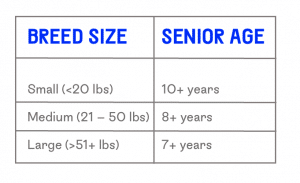Whether you’ve cared for your dog all their life or adopted them at a later stage, senior dogs deserve all the love we can give. While they may not be the same boisterous puppy you once knew, just one look in their eyes and you’ll still see that sparkle of mischief and unconditional devotion.
So, what do you need to know as a pet owner? What kind of dog food is best for senior dogs? How will your dog’s exercise needs change, and what common health concerns should you keep an eye on? In this article, we’ll explore all of that and more.
When is a Dog Considered “Senior”?
First, let’s take a look at when, exactly, a dog is considered a senior pup. While you may have heard that each year of your dog’s life is equal to seven human years, it’s a bit more complicated than that.
Recent research shows that for a medium-sized dog, it’s more like this:
- The first year of the dog’s life is equal to 15 human years
- The second year of the dog’s life is equal to nine human years
- After that, each human year is approximately five years for a dog
With this calculation, a medium-sized dog would be like a human 60-year-old at the age of 10. Many experts prefer to break it down further by breed size:
The reason for this is that smaller dogs tend to age more slowly and have longer lifespans (about 15-16 years) compared…













